| Srl | Item |
| 1 |
ID:
089555
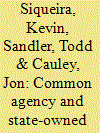

|
|
|
|
|
| Publication |
2009.
|
| Summary/Abstract |
This paper applies a common-agency model to demonstrate why recent enterprise reforms that assign the State Asset Supervision and Administration Commission (SASAC) a greater role in running China's state-owned enterprises (SOEs) are apt to fail. In a theoretical framework, we show that local principals' incentive payments are likely to clash with those of SASAC as local SOE principals' promote social stability and SASAC bolsters SOE efficiency. A second-best outcome requires a social planner to restrict actions by local principals and to impose taxes/subsidies to address inter-principal externalities. In the long run, the simplest solution is to privatize SOEs and find a public-sector funding source for promoting social stability.
|
|
|
|
|
|
|
|
|
|
|
|
|
|
|
|
| 2 |
ID:
090938
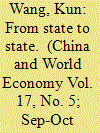

|
|
|
|
|
| Publication |
2009.
|
| Summary/Abstract |
This paper uses a sample of Chinese listed companies whose controlling shareholders have changed from government agencies to state-owned enterprises (SOEs), to examine whether reducing government intervention while maintaining government's ultimate control could improve firm performance. The results show that the overall performance of these firms improves after the transfer of their controlling shareholders, due to improvements in both operating and non-operating performance. When we separate all samples into solely SOEs and other SOEs based on the controlling shareholder, we find that operating performance improved significantly in the solely SOE group, whereas non-operating performance improved significantly in the SOE group. In addition, we identify sources of performance improvement from two perspectives: corporate governance and related party transactions. The results imply that the Chinese Government should continue to decentralize control and, at the same time, continue to monitor firm operating efficiency.
|
|
|
|
|
|
|
|
|
|
|
|
|
|
|
|
| 3 |
ID:
160006
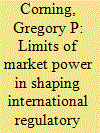

|
|
|
|
|
| Summary/Abstract |
What factors shape the ability of the United States to negotiate international regulatory cooperation? This paper discusses three theoretical approaches that help to explain the potential for regulatory change – market power, historical institutionalism, and loss avoidance – and applies them to the negotiation of regulatory issues in the Trans-Pacific Partnership (TPP). It seeks to understand why the regulatory disciplines in some TPP chapters were more rigorous than those in other chapters. Focusing on case-studies of the chapters on state-owned enterprises and regulatory coherence, the paper argues that the market power of the United States is more likely to secure stronger regulatory disciplines when there is: (1) a strong loss avoidance coalition in the USA pushing for change, and (2) a weakly institutionalized regulatory framework among parties in a given issue area that makes path dependence less important.
|
|
|
|
|
|
|
|
|
|
|
|
|
|
|
|
| 4 |
ID:
151579
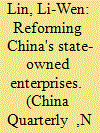

|
|
|
|
|
| Summary/Abstract |
The Chinese Communist Party has recently unveiled its new agenda for state-owned enterprise (SOE) reform. Most attention to date has focused on structural reform through the so-called “mixed ownership” policy. This article is to direct attention to a critically important yet much less analysed item on the SOE reform agenda: the professionalization of the SOE executive personnel. This article provides an empirical study on the managerial elite of China's financial and non-financial SOEs. The findings suggest a politically constrained management approach in the Chinese state-owned sector. Moreover, an innovative analysis of the SOE executive career patterns reveals that the state-controlled banks and industrial SOEs employ divergent human resource management methods. The anatomy of the SOE managerial elite in this article provides a timely evaluation of the recent SOE reform policy and a richer understanding of China's state-owned sector from a comparative capitalism perspective.
|
|
|
|
|
|
|
|
|
|
|
|
|
|
|
|
| 5 |
ID:
159397
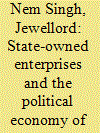

|
|
|
|
|
| Summary/Abstract |
The literature on developmental states has built theories of growth-enhancing strategies through a mutually constitutive state–business relationship and institutionalised expertise through a professional bureaucracy. Whilst most evidence bears on the East Asian context, recent empirical work has focussed on state agency and new industrial policies in response to global market integration. Our paper contributes to this debate by exploring multiple patterns of state enterprise reforms that have enabled governments to generate competitive domestic firms. These reforms, then, lead to new theoretical insights as regards the diverse institutional arrangements co-constituting state–state relationships across countries and sectors. Overall, the paper views state-owned enterprises (SOEs) as complex organisations that bear new developmental capacities rather than vessels of rent-seeking interests.
|
|
|
|
|
|
|
|
|
|
|
|
|
|
|
|
| 6 |
ID:
146646
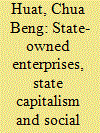

|
|
|
|
|
| Summary/Abstract |
State-owned enterprises and sovereign wealth funds have ‘insured’ Singapore's domestic economy against financial crisis and restructuring interventions from multilateral institutions, engendered elite cohesion and political stability, binding middle class employees to the political system. This essay analyses paths by which the Singapore government established state-owned enterprises and transformed them into global enterprises. It also examines how sovereign wealth funds contribute to government social expenditure without increasing taxes. Such redistribution through state capitalism resonates with the People's Action Partys social democratic origins, inviting comparisons with contemporary developments in Chinese state-capitalism.
|
|
|
|
|
|
|
|
|
|
|
|
|
|
|
|